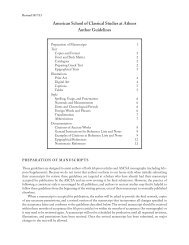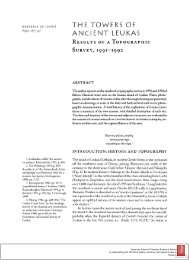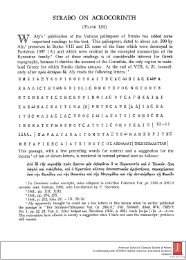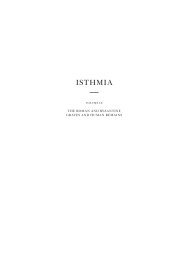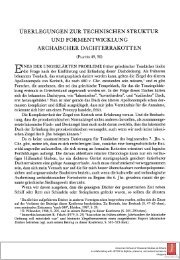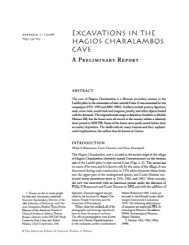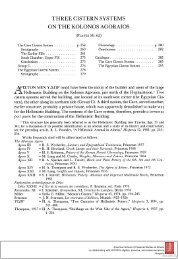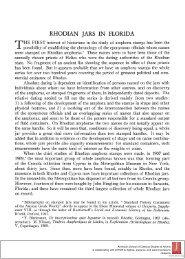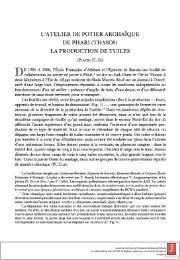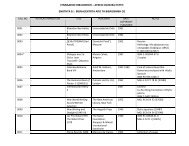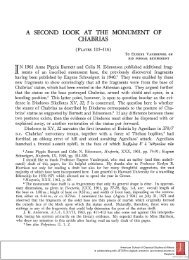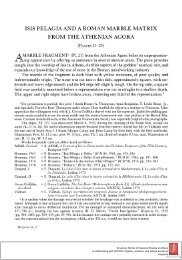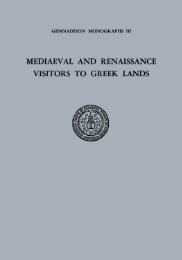the attic stelai - The American School of Classical Studies at Athens
the attic stelai - The American School of Classical Studies at Athens
the attic stelai - The American School of Classical Studies at Athens
You also want an ePaper? Increase the reach of your titles
YUMPU automatically turns print PDFs into web optimized ePapers that Google loves.
262 W. KENDRICK PRITCHETT<br />
authors; ' in <strong>the</strong> meantime, <strong>the</strong> following remarks are <strong>of</strong>fered concerning <strong>the</strong> meaning<br />
<strong>of</strong> <strong>the</strong> terms occurring in our lists. <strong>The</strong> specific meanings which <strong>the</strong>se words seem<br />
to bear in <strong>the</strong> Attic Stelai are given on p. 269.<br />
1. dypoS (VI, 55; VII, 74). This word is frequently used in <strong>the</strong> liter<strong>at</strong>ure in<br />
anti<strong>the</strong>sis with o6AtX or a'wrrv. In <strong>the</strong> Odyssey: "Your fa<strong>the</strong>r abides here in <strong>the</strong><br />
country (aypw') and goes not down to <strong>the</strong> city." ? Similarly, in Pl<strong>at</strong>o, Lg., IX, 881 c:<br />
"--- if <strong>the</strong> assault occur in <strong>the</strong> city --- <strong>the</strong> punishment shall be inflicted by <strong>the</strong><br />
astynomoi; and if it occur KMr' aypovS rS Xaopas, by <strong>the</strong> <strong>of</strong>ficers <strong>of</strong> <strong>the</strong> agronomoi."<br />
In Lysias, XXXI, Against Philon, 8: " This man was banned from <strong>the</strong> city - - - and<br />
for a time he lived Ev ayp4." In [Demos<strong>the</strong>nes], XLVII, Against Euergos and<br />
Mnesiboulos, 63: --- went <strong>at</strong> once from <strong>the</strong> city Ebg a'ypov." In several places in<br />
Lysias, I, On <strong>the</strong> Murder <strong>of</strong> Er<strong>at</strong>os<strong>the</strong>nes, <strong>the</strong> speaker uses agros in <strong>the</strong> sense <strong>of</strong><br />
'country.' 7<br />
<strong>The</strong> word seems to be used, however, not only for <strong>the</strong> general sense <strong>of</strong> 'country,'<br />
but for a field or farm which was in <strong>the</strong> country. So [Demos<strong>the</strong>nes], LIII, Against<br />
Nikostr<strong>at</strong>os, 6: " Three slaves ran away from him from his farm (Ef aypov) In<br />
."'<br />
Isaios, VI, Est<strong>at</strong>e <strong>of</strong> Philoktemnon, 33: "- - - he sold ayp6v <strong>at</strong> Athmonon for seventyfive<br />
minas to Antiphanes "; and VIII, Est<strong>at</strong>e <strong>of</strong> Kiron, 35: "<strong>the</strong> property <strong>of</strong> Kiron<br />
consisted <strong>of</strong> ayp6v <strong>at</strong> Phyla easily worth a talent --- "; and in XI, Est<strong>at</strong>e <strong>of</strong> Hagnias,<br />
42, <strong>the</strong> speaker st<strong>at</strong>es th<strong>at</strong> <strong>the</strong> real property <strong>of</strong> Str<strong>at</strong>okles was divided into houses and<br />
O ayp6S worth 12 minae. In Thucydides, II, 13, 1: Pericles - - - conceived a suspicion<br />
th<strong>at</strong> perhaps Archidamos might pass by rovi aypovS avrov and not lay <strong>the</strong>m<br />
waste." 8 Buck classifies dyp6S under <strong>the</strong> general heading <strong>of</strong> ' agriculture' and under<br />
<strong>the</strong> sub-heading <strong>of</strong> ' field for cultiv<strong>at</strong>ion.'<br />
In our list, it is to be noted th<strong>at</strong> a house may be situ<strong>at</strong>ed on an agros," and <strong>the</strong><br />
agros, in turn, may be described as containing so many plethra <strong>of</strong> land.1' <strong>The</strong> meaning<br />
<strong>of</strong> <strong>the</strong> word, <strong>the</strong>n, would here seem to be ' farm ' or a ' field for cultiv<strong>at</strong>ion ' in <strong>the</strong><br />
country."2<br />
Op. cit., p. 246, note 9.<br />
6 XI, 187-188: mrarrqp 8E Uos'; aVro0L 11wtvet<br />
ayp,W oOVO 7AWOXV f KaTrpXrT<strong>at</strong>.<br />
I<br />
11, 13, 20, 22, 39.<br />
8<br />
J. E. Powell in his Lexicon to Herodotus, Cambridge, 1938, p. 3, defines &ypoc in I, 172, as <strong>the</strong><br />
cultiv<strong>at</strong>ed land <strong>of</strong> a city, but <strong>the</strong> reference is clearly to country dwellings in <strong>the</strong> Milesian territory.<br />
9 Op. cit., p. 489. Buck notes th<strong>at</strong> Greek agros like L<strong>at</strong>in ager is <strong>of</strong>ten used in a wider sense<br />
for 'open country' vs. 'town.' On page 1304, Buck indic<strong>at</strong>es th<strong>at</strong> it is <strong>the</strong> plural aypot (but also<br />
singular in Homer) which is particularly used in <strong>the</strong> sense <strong>of</strong> 'country.'<br />
10 VII, 73, 77.<br />
"VII, 74.<br />
12 <strong>The</strong> word occurs in an Ionian inscription <strong>of</strong> Erythrai (A<strong>the</strong>na, XX, 1908, pp. 167-169) where<br />
Van Herwerden (Lexicon Graecum, Leyden, 1910, s.v.) transl<strong>at</strong>es it as 'cultus,' and Liddell-Scott-<br />
Jones as 'tilled land.'



